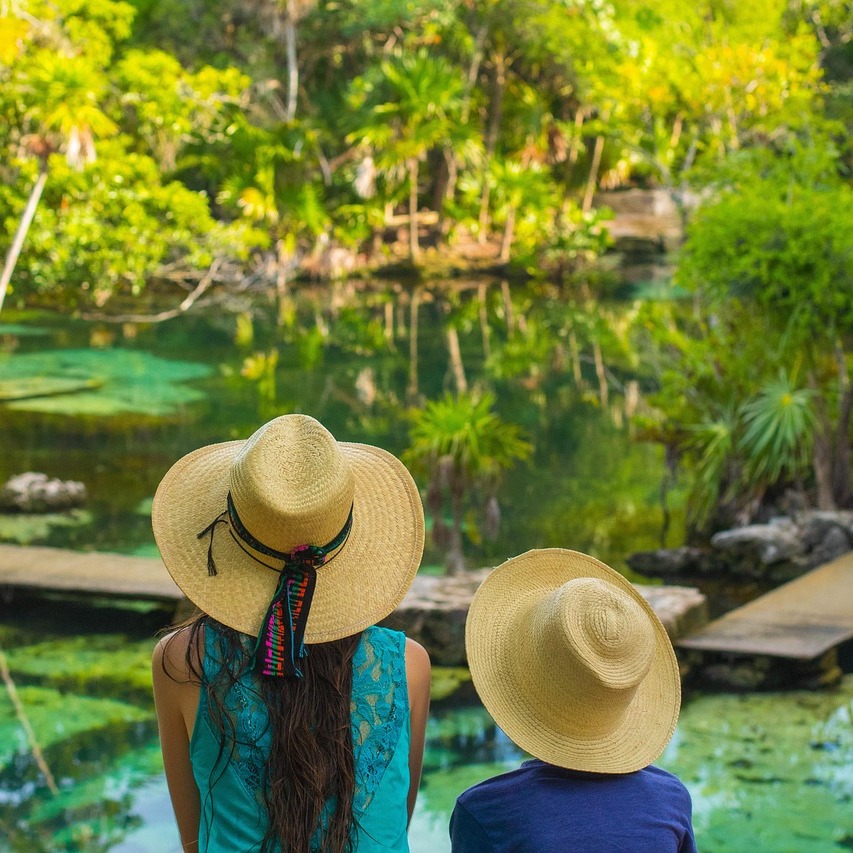Bibliometric Analysis of Ecotourism and Sustainable Tourism: A Study of Trends in Scientific Publications
Keywords:
ecotourism, sustainable tourism, central Valle del Cauca, conservation, local developmentMain Article Content
Ecotourism and sustainable tourism have experienced significant growth globally, driven by increasing concerns about environmental conservation and sustainable development. In central Valle del Cauca, Colombia, these forms of tourism emerge as alternatives with potential to promote ecosystem conservation and local economic development. This study conducts a bibliometric analysis of scientific literature on ecotourism and sustainable tourism, aiming to identify trends, authors, institutions, and key terms in research published between 2014 and 2024. Using tools such as the UNESCO Thesaurus, Scopus, Web of Science, Tree of Science, and VOSviewer, descriptors, keywords, and co-occurrences are analyzed to map the current state of research in these fields. The results indicate that ecotourism is a central topic in recent literature, with a strong correlation between the concepts of sustainability and tourism development. However, the analysis reveals a gap in the practical application of this knowledge to the specific context of Valle del Cauca, where the challenges and opportunities associated with implementing ecotourism and sustainable tourism have not been sufficiently explored. This study contributes to the understanding of research dynamics in ecotourism and sustainable tourism, highlighting the need for future studies to more directly address local implications, thereby strengthening the link between theory and practice in promoting sustainable tourism in the region.
Akinci, Z., & Oksuz, E. (2022). Local People's View on Tourism in Context of Sustainable Tourism Principles: An Importance-Performance Analysis. An International Journal of Akdeniz University Tourism Faculty, 10(4), 501-529. https://doi.org/10.30519/ahtr.894259 DOI: https://doi.org/10.30519/ahtr.894259
Alfaro, J., Martínez, A., & Mondéjar, J. (2020). An approach to measuring sustainable tourism at the local level in Europe. Current Issues in Tourism, 23(4), 423-437. https://doi.org/10.1080/13683500.2019.1579174 DOI: https://doi.org/10.1080/13683500.2019.1579174
Buckley, R. (2012). Sustainable tourism: Research and reality. Annals of Tourism Research, 39(2), 528-546. https://doi.org/10.1016/j.annals.2012.02.003 DOI: https://doi.org/10.1016/j.annals.2012.02.003
Chih-Hsing, L., & Jeou-Shyan, H. (2016). An Empirical Examination of the Form of Relationship Between Sustainable Tourism Experiences and Satisfaction. Asia Pacific Journal of Tourism Research, 21(7), 717-740. https://doi.org/10.1080/10941665.2015.1068196 DOI: https://doi.org/10.1080/10941665.2015.1068196
Clarivate Analytics. (2021). El índice de citas y la plataforma de inteligencia de investigación más grande del mundo sin editoriales. https://www.webofknowledge.com
Elsevier. (2021). Scopus: base de datos de citas y resúmenes de expertos. https://www.elsevier.com/solutions/scopus
Galvez, C. (2018). Análisis de co-palabras aplicado a los artículos muy citados en Biblioteconomía y Ciencias de la Información (2007-2017). TransInformação, 30(3), 277-286. https://doi.org/10.1590/2318-08892018000300001 DOI: https://doi.org/10.1590/2318-08892018000300001
Hernández-Sampieri, R., Fernández-Collado, C., & Baptista-Lucio, P. (2014). Metodología de la investigación (6.ª ed.). México: McGraw Hill.
Hung, T., & Hsieh, H. (2016). Indicators of sustainable tourism: A case study from a Taiwan's wetland. Ecological Indicators, 67, 779-787. https://doi.org/10.1016/j.ecolind.2016.03.023 DOI: https://doi.org/10.1016/j.ecolind.2016.03.023
Hunter, C. (1995). On the need to re‐conceptualise sustainable tourism development. Journal of Sustainable Tourism, 3(3), 155-165. https://doi.org/10.1080/09669589509510720 DOI: https://doi.org/10.1080/09669589509510720
Hunter, C. (1997). Sustainable tourism as an adaptive paradigm. Annals of Tourism Research, 24(4), 850-867. https://doi.org/10.1016/S0160-7383(97)00036-4 DOI: https://doi.org/10.1016/S0160-7383(97)00036-4
Mackenzie, N., & Gannon, M. (2019). Exploring the antecedents of sustainable tourism development. International Journal of Contemporary Hospitality Management, 31(6), 2411-2427. https://doi.org/10.1108/IJCHM-05-2018-0384 DOI: https://doi.org/10.1108/IJCHM-05-2018-0384
Plummer, R., & Fennell, D. (2009). Managing protected areas for sustainable tourism: prospects for adaptive co-management. Journal of Sustainable Tourism, 17(2), 149-168. https://doi.org/10.1080/09669580802359301 DOI: https://doi.org/10.1080/09669580802359301
Roblek, V., Drpic, D., Mesko, M., & Milojica, V. (2021). Evolution of Sustainable Tourism Concepts. Sustainability, 13(22), 12-29. https://doi.org/10.3390/su132212829 DOI: https://doi.org/10.3390/su132212829
Ross, S., & Wall, G. (1999). Ecotourism: towards congruence between theory and practice. Tourism Management, 20(1), 123-132. https://doi.org/10.1016/S0261-5177(98)00098-3 DOI: https://doi.org/10.1016/S0261-5177(98)00098-3
Saparniené, D., Mejeré, O., Raisutiené, J., Jukneviciené, V., & Rupuleviciené, R. (2022). Expression of Behavior and Attitudes Toward Sustainable Tourism in the Youth Population: A Search for Statistical Types. Sustainability, 14(1), 473. https://doi.org/10.3390/su14010473 DOI: https://doi.org/10.3390/su14010473
Scheyvens, R. (1999). Ecotourism and the empowerment of local communities. Tourism Management, 20(2), 245-249. https://doi.org/10.1016/S0261-5177(98)00069-7 DOI: https://doi.org/10.1016/S0261-5177(98)00069-7
Scopus. (2023a). Štetić, Snežana. Perfil generado por Scopus. https://www.scopus.com/authid/detail.uri?authorId=55609246400
Scopus. (2023b). Trišić, Igor. Perfil generado por Scopus. https://www.scopus.com/authid/detail.uri?authorId=57212602280
Sharpley, R. (2000). Tourism and Sustainable Development: Exploring the Theoretical Divide. Journal of Sustainable Tourism, 8(1), 1-19. https://doi.org/10.1080/09669580008667346 DOI: https://doi.org/10.1080/09669580008667346
Trišić, I., & Štetić, S. (2021). Perspectives on Sustainable Tourism Development in the Hotel Industry—A Case Study from Southern Europe. Sustainability, 13(10), 55-63. https://doi.org/10.3390/su13105563 DOI: https://doi.org/10.3390/su13105563
Universidad Nacional de Colombia. (2016). Una idea emprendedora. Tree of Science. http://untelevision.unal.edu.co/detalle/article/tree-of-science.html
Vosviewer. (2021). Welcome to VOSviewer. https://www.vosviewer.com/
Downloads

This work is licensed under a Creative Commons Attribution-NonCommercial-NoDerivatives 4.0 International License.

